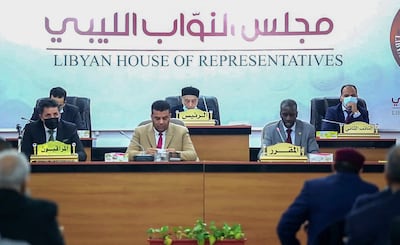Libya's parliament has approved laws for national presidential and parliamentary elections, the chamber's spokesman said, but continued disputes over the process may make it difficult to hold an election.
A majority of members in the House of Representatives (HoR) backed the laws in a vote on Monday, spokesman Abdullah Belaihaq said.
He did not release the voting tally or number of members present.
Another internationally recognised Libyan legislative body, the High State Council (HSC), has not issued a clear statement on whether it has also approved the laws and there are disputes in Libya's political system over whether it would need to do so.
Libya has had little peace or stability since a 2011 Nato-backed uprising that toppled the dictator Muammar Qaddafi. In 2014, control of the country was divided between eastern and western factions, with rival administrations governing in each area.
The HoR is based in the east and the HSC is in Tripoli, in the west, where the internationally recognised Government of National Unity (GNU) is also based.
Libya's political divisions played into the recent disaster in Derna when dams broke under heavy rain, washing away much of the town in a flash flood that killed thousands of people.
International diplomacy to resolve Libya's conflict has focused on pushing for parliamentary and presidential elections to replace the interim political institutions, including the HoR, HSC and GNU.

An attempt to hold an election in 2021 collapsed because of disputes over the rules after the HSC and other parts of Libya's political system rejected electoral laws issued by the HoR.
The laws presented by Mr Saleh on Wednesday were written by a joint committee of HoR and HSC members who met in Morocco earlier this year, but the UN envoy said in July that the laws "in their current state would not enable successful elections".
The HoR has said it wants to replace the GNU with an interim government before any election, something that could prompt a new bout of violence.
Mr Saleh has previously presented laws whose validity some HoR members later disputed, accusing him of abusing parliamentary processes. He has denied that.
Chaos erupted in parliament in July before a debate on a draft election law when several members interrupted Mr Saleh at the start of its session. A broadcast on Libya Almustaqbal TV was cut short after several MPs began heckling Mr Saleh as he read a statement from MPs who boycotted the session.
Elections were expected to take place in December 2021 but disagreements over who should stand in the polls and other issues meant they were never held. The UN has been working to ease the situation, in the hope elections could take place this year.

